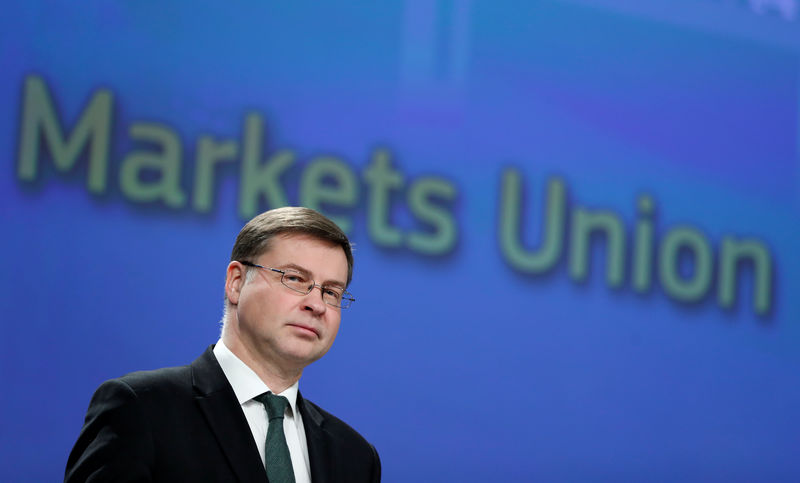 © Reuters. European Commission Vice President Valdis Dombrovskis takes part in a news conference on the capital markets in Brussels
© Reuters. European Commission Vice President Valdis Dombrovskis takes part in a news conference on the capital markets in BrusselsBy Huw Jones
LONDON (Reuters) – The European Union stepped up efforts on Monday to create a more unified and cheaper capital market by next year when it faces the loss of Britain, the bloc’s biggest financial center.
The EU’s executive European Commission set out its latest plans for a ‘capital markets union’ (CMU), a project initially focused on reducing heavy reliance of company funding on bank loans, but now made more pressing by Brexit.
Many continental European companies and listed funds use banks and asset managers in London. Britain is set to leave the European Union in March 2019 and the future trading links of its giant financial services industry with the EU are still unclear.
The latest EU proposals include common rules for the covered bond market, a 2.1 trillion euro ($2.6 trillion) sector whose funding role in countries like Germany and Denmark the bloc wants replicated more broadly.
The commission also proposes to cut red tape imposed by national watchdogs on mutual and alternative investment funds from other EU states.
“To have a genuine capital markets union in Europe by 2019, we need to advance in three directions: European labels and passports for financial products, harmonized and simplified rules to deepen capital markets, and more consistent and efficient supervision,” European Commission Vice President Valdis Dombrovskis said in a statement.
The covered bond market, where debt is issued on the back of a ringfenced pool of high quality home loans and public debt, is fragmented along national lines.
The four largest markets account for about two-thirds of the EU market, and in some member states there is no covered bond market at all. The commission says a more unified, pan-EU approach would save EU borrowers an estimated 1.5 billion euros to 1.9 billion euros annually.
The EU proposals set out a common definition for covered bonds and their features, spell out who supervises them, and introduce rules for a European covered bond “label” to reassure investors.
Proposals for mutual and alternative investment funds seek to remove “complex and burdensome requirements and harmonise diverging national rules,” the commission said.
While the EU mutual funds markets under its “UCITS” banner is huge, the bulk of assets are domestic because funds and face extra marketing requirements and regulatory costs if they are offered outside the home state.
Brussels says the proposed measures should save up to 440 million euros annually in costs for existing cross-border distribution.
The commission also announced steps to inject more legal certainty into resolving cross-border disputes over debt claims, and into ownership of a security involving more than one country.
EU states and the European Parliament will have the final say on the commission’s proposals, with changes expected.
($1 = 0.8110 euros)
Fusion Media or anyone involved with Fusion Media will not accept any liability for loss or damage as a result of reliance on the information including data, quotes, charts and buy/sell signals contained within this website. Please be fully informed regarding the risks and costs associated with trading the financial markets, it is one of the riskiest investment forms possible.
Source: Investing.com




























